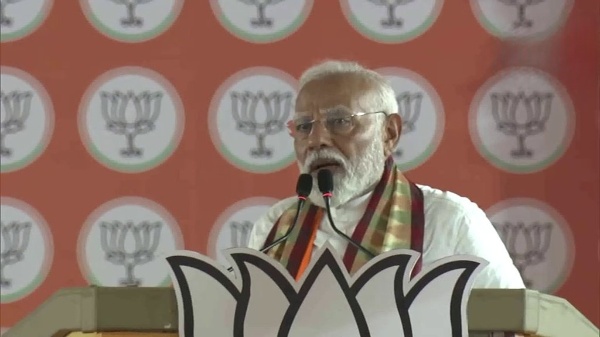In a spirited address to a gathering in Kendrapara, Odisha, Prime Minister Narendra Modi delivered a scathing critique of the Congress party’s governance legacy while championing his Bharatiya Janata Party’s (BJP) decade-long tenure marked by developmental strides. Modi’s speech served as a platform to underscore the perceived contrasts between the alleged era of scandals under Congress rule and what he portrayed as a decade of robust progress under his leadership.
With fervor and conviction, Prime Minister Modi asserted, “The country has seen decades of the Congress rule as well a decade of the BJP rule. The decades under Congress rule saw nothing but big scams…and the last ten years under the Modi government were all about development.”
Modi’s remarks echo the BJP’s recurrent narrative, painting itself as the torchbearer of development and accountability, while depicting the Congress regime as synonymous with corruption and maladministration. By juxtaposing the purported misdeeds of previous administrations with his government’s purported achievements, Modi sought to reaffirm his party’s commitment to transformative governance and secure public support ahead of looming electoral contests.
During his address, Modi showcased a litany of initiatives spearheaded by his administration, ranging from infrastructure projects to social welfare schemes, as emblematic of his government’s dedication to national progress. Notable programs such as ‘Make in India’, ‘Swachh Bharat Abhiyan’, and ‘Ayushman Bharat’ were spotlighted as exemplars of the BJP’s vision for inclusive growth and prosperity.
Nevertheless, Modi’s assertions were met with skepticism from critics, who argue that the reality of governance under the BJP is far more complex than the rosy picture painted in his speech. Opposition leaders and political analysts have pointed to issues such as economic stagnation, agrarian distress, and concerns regarding democratic norms and freedoms as evidence of a more nuanced appraisal of the BJP’s tenure.
Moreover, Modi’s address comes against the backdrop of a polarized political landscape, with India grappling with multifaceted challenges exacerbated by the COVID-19 pandemic. As the nation navigates a turbulent sea of political rhetoric and policy debates, Modi’s rhetoric serves to galvanize supporters and amplify the ongoing discourse surrounding governance, accountability, and the trajectory of the nation.
In conclusion, Prime Minister Narendra Modi’s address in Kendrapara, Odisha, encapsulated the stark dichotomy between the BJP’s narrative of progress and the Congress party’s legacy of alleged corruption. As India stands at a crossroads, the battle for public perception and electoral dominance continues to shape the contours of the nation’s democratic landscape, with competing visions of governance vying for supremacy.
Modi’s impassioned rhetoric underscores the high stakes involved in shaping India’s future trajectory, as citizens grapple with divergent narratives and weigh the promises and pitfalls of political leadership. Whether Modi’s assertions resonate with the electorate remains to be seen, but his speech in Kendrapara undoubtedly adds fuel to the fiery debates surrounding India’s political discourse.



